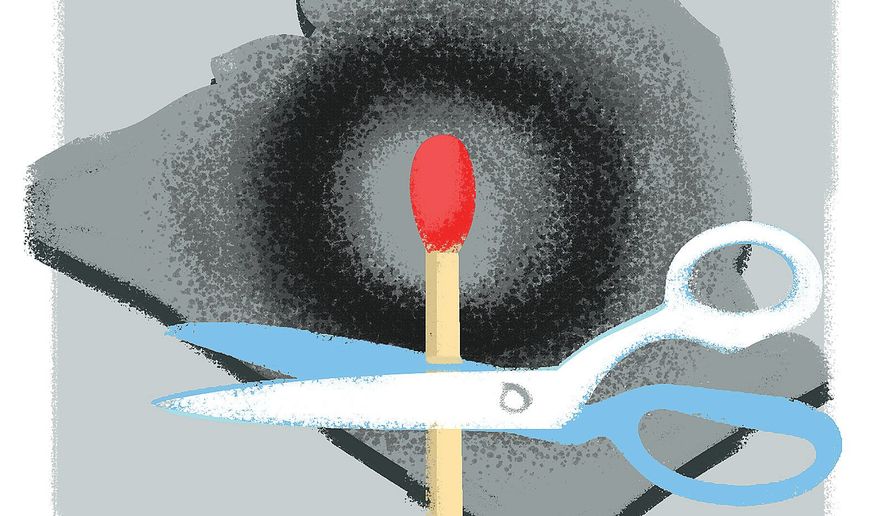OPINION:
When Abdelaziz Bouteflika was elected president of Algeria in 1999, it was at the height of a heinous civil war that carried the very seeds of division and radicalism that plague the whole of the Middle East/North Africa region today.
One fact notwithstanding: Within months of the vote, the new president offered a way out to extremists and was able later to reconcile them into the political process. He knew that if he could build a broader consensus, one that could provide an outlet for political expression to even those with radical viewpoints — we could establish a lasting peace in a country in which hundreds of thousands of people needlessly died for their differences.
This approach was part of a comprehensive strategy that the Algerian government advanced to put an end to terrorist violence and reconcile a wounded nation. We all hoped then, as we do now, that our strategy would also form a model for other leaders, some of whom think they can kill their way through extremism.
Indeed, at a time when extremism predicts and foments an imminent clash between the Western and Muslim civilizations, and within Islam itself, Algerians in the main chose to see a world moving toward forgiveness and reconciliation. As Mr. Bouteflika said, “Our dream depends on our capacity to understand each other, accept others in all their diversity, which could be a source of strength and progress for humanity.”
In this spirit, Algeria introduced and passed a resolution in the United Nations General Assembly declaring May 16 “International Day of Living Together in Peace.” The vision of a tolerant and an open society, rooted in traditions but forward-looking, may seem impossible to some countries doing daily battle with intolerance and violence. Indeed, it was hard to make this a reality in Algeria, as we were still emerging from a tragedy that literally bled the country of lives and very nearly its humanity.
But we succeeded. We fought an unfathomably brutal and destructive war, amid the indifference of the international community, against the evil scourge of terrorism at the hands armed terrorist groups. Their main goal was to destroy the government and its institutions by perpetrating barbaric acts of violence against the population. They targeted, without distinction, men, women, children, intellectuals and state officials and destroyed infrastructure, schools, public buildings and even farmers’ crops.
For these reasons, amnesty was difficult and politically risky. But Mr. Bouteflika never wavered. Soon after his election he authored and pushed toward a reconciliation charter, offering amnesty to those who laid down their arms. The vast majority of extremists did just that. In a public referendum in which nearly 80 percent of the electorate took part, more than 97 percent voted to endorse the reconciliation charter.
The grand lesson is that extremism can be halted with a just, political solution rather than with violence. Sadly, this concept of reconciliation and giving everyone an opportunity for political expression remains a radical concept in a region beset by factions and profound enmities. But there is hope for the approach. In the last few years alone, Algeria helped convene peace talks between warring factions in conflicts in Mali, Tunisia, Burkina Faso and Libya, and brokered agreements modelled on our example of restorative justice and reconciliation.
One can be proud that among Algeria’s achievements is the May 16 designation. Its aim is to promote peace through harmonious habitation with no distinction between nationality, gender, language or religion. The designation calls upon all U.N. member states to promote reconciliation, and ensure peace and sustainable development.
Algeria doesn’t always get the headlines, but we are ever-advancing toward a just and equal society. The president proposed and passed a legal requirement that women fill at minimum of 1/3 of the seats in parliament. He insisted on the adoption of Tamazight as an official national language and passed a law creating an Algerian Academy of the Amazigh language, embracing our nation’s diversity and bringing recognition and dignity to a long-marginalized minority.
Importantly, we have guided the implementation of de-radicalization programs to ensure that those who once embraced extremism are brought back into the fold of society and given the support they need to thrive.
Mr. Bouteflika’s greatest hope, after his long career in service to his country, is that these simple principles of dignity, justice and forgiveness come to pass for all the world. Without them, the vicious cycle of intolerance and violence persists, looming even among so-called developed countries. None are immune to or above the power of hate. But all are capable of transcending it.
• Abdelkader Messahel is minister of foreign affairs for the People’s Democratic Republic of Algeria.




Please read our comment policy before commenting.